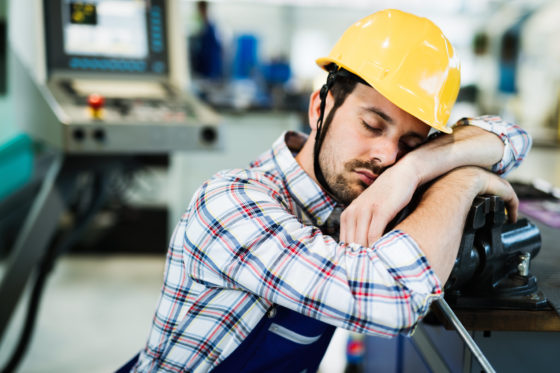Did you make any New Year’s resolutions? How about getting more sleep? See why it’s a good idea; read the NSC’s 2017 Employee Survey on Workplace Fatigue.

Photo credit: iStock.com/nd3000
My New Year’s resolution for 2018 is to get more sleep. Being tired is something I avoid as much as possible, but occasionally I stay up too late or something wakes me up. Then I pay the next day – a higher cost for each hour lost.
“As soon as a person awakes, their body begins to accumulate the need for sleep. With each passing hour, their need for sleep rises,” reads a 2017 report from the National Safety Council (NSC). “A person needs 7–9 hours of sleep a day to perform at an optimal level.”
Risk factors for workplace fatigue
The NSC found that 97 percent of workers have at least one risk factor for workplace fatigue. Lack of sleep is one, along with overnight shifts, long working hours, long commutes, and more. Please take a look at Fatigue in the Workplace: Causes and Consequences of Employee Fatigue for details on what the NSC learned from surveying more than 2,000 workers in the United States. “Fatigue can have detrimental effects on a person’s health and safety both on and off the job. When multiple risk factors are present, the potential for injuries on the job increases,” it reads.
It’s easy to see how things can go wrong if you consider just three of the direct effects of fatigue listed in WorkSafeBC’s bulletin, The dangers of fatigue in the workplace:
- Difficulty concentrating
- Slower reaction times
- Decreased ability to respond to changes in surroundings or information provided
The bulletin also offers tips on how to improve your quality of sleep, such as going to bed and getting up at the same time every day. Unfortunately, not everyone has control over their work schedules. Remember the film-crew friend I wrote about in my post Managing fatigue when you work long hours? He said: “It’s cheaper to pay overtime and work the crew long days than it is to pay for another day with all the gear, so we work at all different times of day and night.” And an average shift on set is 14 hours.
So, wish me luck with getting more sleep – and let me know, in the Comments box below, if you made any New Year’s resolutions for 2018.


